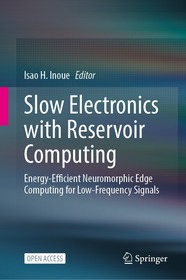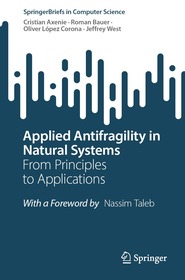
Slow Electronics with Reservoir Computing
Energy-Efficient Neuromorphic Edge Computing for Low-Frequency Signals
-
12% KEDVEZMÉNY?
- A kedvezmény csak az 'Értesítés a kedvenc témákról' hírlevelünk címzettjeinek rendeléseire érvényes.
- Kiadói listaár EUR 53.49
-
22 184 Ft (21 128 Ft + 5% áfa)
Az ár azért becsült, mert a rendelés pillanatában nem lehet pontosan tudni, hogy a beérkezéskor milyen lesz a forint árfolyama az adott termék eredeti devizájához képest. Ha a forint romlana, kissé többet, ha javulna, kissé kevesebbet kell majd fizetnie.
- Kedvezmény(ek) 12% (cc. 2 662 Ft off)
- Kedvezményes ár 19 522 Ft (18 593 Ft + 5% áfa)
Iratkozzon fel most és részesüljön kedvezőbb árainkból!
Feliratkozom
22 184 Ft

Beszerezhetőség
Még nem jelent meg, de rendelhető. A megjelenéstől számított néhány héten belül megérkezik.
Why don't you give exact delivery time?
A beszerzés időigényét az eddigi tapasztalatokra alapozva adjuk meg. Azért becsült, mert a terméket külföldről hozzuk be, így a kiadó kiszolgálásának pillanatnyi gyorsaságától is függ. A megadottnál gyorsabb és lassabb szállítás is elképzelhető, de mindent megteszünk, hogy Ön a lehető leghamarabb jusson hozzá a termékhez.
A termék adatai:
- Kiadó Springer Nature Singapore
- Megjelenés dátuma 2025. december 6.
- Kötetek száma 1 pieces, Book
- ISBN 9789819683826
- Kötéstípus Keménykötés
- Terjedelem160 oldal
- Méret 235x155 mm
- Nyelv angol
- Illusztrációk VII, 160 p. 69 illus., 54 illus. in color. Illustrations, black & white 700
Kategóriák
Hosszú leírás:
This open access book discusses “slow electronics”, the study of devices processing signals with low frequencies. Computers have the remarkable ability to process data at high speeds, but they encounter difficulties when handling signals with low frequencies of less than ~100Hz. They unexpectedly require a substantial amount of energy. This poses a challenge for such as biomedical wearables and environmental monitors that need real-time processing of slow signals, especially in energy-limited 'edge’ environments with small batteries.
One possible solution to this issue is event-driven processing, which entails the use of non-volatile memory to read/write data and parameters every time a slow (sporadic) signal is detected. However, this approach is highly energy-consuming and unsuitable for the edge environments. To address this challenge, the authors propose “slow electronics” by developing electronic devices and systems that can process low-frequency signals more efficiently. The biological brain is an excellent example of the slow electronics, as it processes low-frequency signals in real time with exceptional energy efficiency. The authors have employed reservoir computing with a spiking neural network (SNN) to simulate the learning and inference of the brain.
The integration of slow electronics with SNN reservoir computing allows for real-time data processing in edge environments without an internet connection. This will reveal the determinism or periodicity behind unconscious behaviours and habits that have been difficult to explore due to privacy barriers thus far. Moreover, it may provide a more profound understanding of a craftsman's skills, which they may not even be aware of.
This book emphasises the most recent concepts and technological developments in slow electronics. Discussion on the captivating subject of slow electronics are given by delving into the complexities of reservoir calculation, analogue CMOS circuits, artificial neuromorphic devices, and numerical simulation with extended time constants, paving the way for more people-friendly devices in the future.
TöbbTartalomjegyzék:
Introduction: what is ‘slow electronics’.- Reservoir Computing Models for Slow Electronics.- Fabricating Elements of Slow Electronics with Functional Materials.- Analog CMOS Implementations of Hardware Neurons for Slow Electronics.- Learning and inference in slow electronics: numerical simulation.- Learning and Inference in slow electronics: FPGA emulation and implementation.- Slow Electronics and Attractor.- Decoding the Unseen, Shaping the Future.
Több




